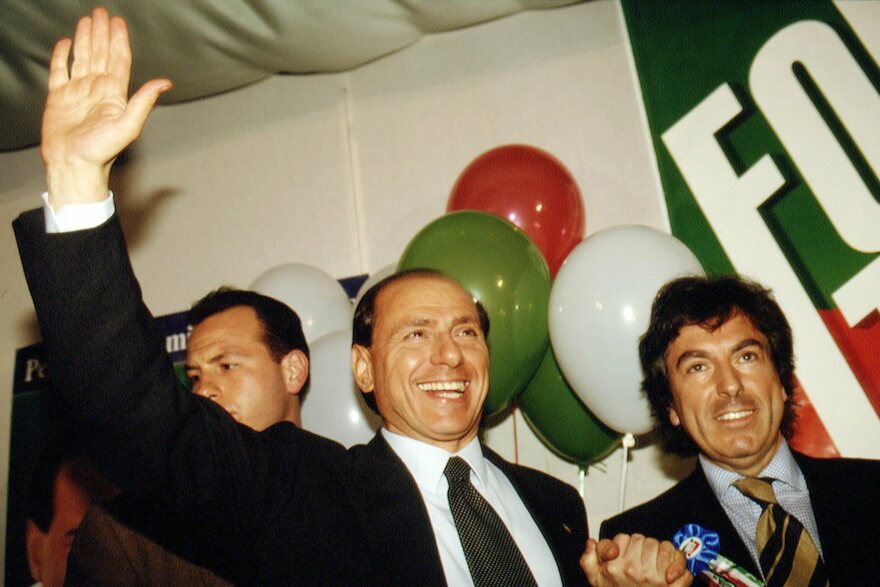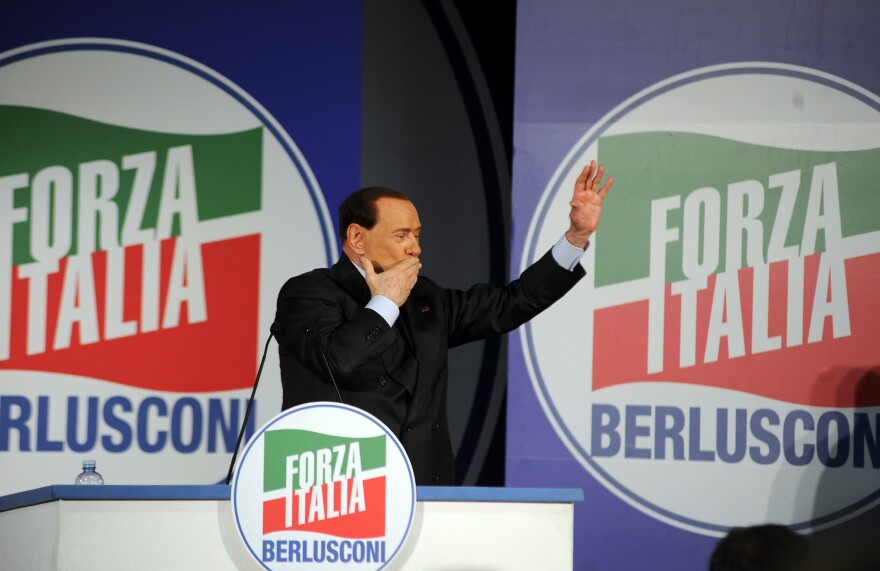ROME — Former Italian prime minister, and sitting senator in the Italian parliament, Silvio Berlusconi died at the age of 86, according to reports from Italian media on Monday.
No cause of death was immediately available. He was hospitalized last week for planned medical checks related to his chronic leukemia.
The media mogul served as Italy's prime minister multiple times beginning in 1994, and his flamboyant lifestyle left a mark on popular culture, while his abrasiveness, coarseness, populist style, and constant legal woes trashed political norms and tainted Italy's image in the world.
A born showman, Berlusconi liked to brag that his career began as a crooner on cruise ships. He moved on to construction and real estate, and built an empire — television networks, newspapers, publishing houses, a top soccer team and much more.
Empire-building
It all started with a 1970s game show, when a caller's right answer prompted a housewife in the studio to strip a piece of clothing.
"If someone had told me this was the beginning of a new empire, a huge media empire and a new political order, where the owner of the media empire also become the prime minister and this whole story would start with a striptease program, I would laugh," says Erik Gandini, director of Videocracy, a 2009 documentary about Italian television and its impact on the country's culture and politics.
By the 1980s, it had grown to Italy's biggest media empire, Mediaset. That allowed Berlusconi to branch out, and he went on to own Italy's largest publishing house, the newspaper Il Giornale and the AC Milan soccer club.
With a carousel of soap operas and scantily clad showgirls, his networks molded an adoring audience into a virtual electorate.
Political scandals opened Berlusconi's path to politics
In the early 1990s, when bribery scandals toppled the political establishment, Berlusconi moved to fill the vacuum. With his rags-to-riches story, he sold many Italians a rosy dream of prosperity and lower taxes.

In the 1994 general elections, Berlusconi swept to power. The government crumbled just seven months later but, over the next two decades, he showed the world that humility was not one of his virtues.
"I am by far the best prime minister Italy ever had," he exclaimed.
It was an open secret that Berlusconi had entered politics to safeguard his empire. Berlusconi was enmeshed in legal troubles through the 1990s, from providing false testimony to investigations into ties with the Sicilian Mafia.
Consolidates power and control
With no conflict-of-interest legislation in place to stop him, Berlusconi not only kept his TV networks as prime minister, he won control of all state-run broadcasting as well.
Maurizio Viroli, who teaches politics and government at the University of Texas - Austin, says the power Berlusconi wielded was closer to tyranny.
"A power that no political leader has ever been able to concentrate in his own hands in any democratic or liberal country in history," Viroli says. "That's why I use the word 'tyranny.' "
Berlusconi developed close personal ties with Russian leader Vladimir Putin and the late Libyan strongman Moammar Gadhafi.
But abroad, Berlusconi was often mocked for his perma-tan, hair transplants and facelifts.
And while his schoolboy pranks, off-color jokes and racist remarks left him increasingly shunned on the international stage, he became the longest-serving prime minister in Italian history — governing at different times between 1994 and 2011, for a total of approximately nine years.
Foreign commentators could not fathom the secret of Berlusconi's popularity.
Viroli calls it Italians' dislike for moral principles. "When they see someone who tells them it is right not to have principles, to disregard civic duties, to violate the laws, they love him."
Legal woes finally caught up with him, but he won political office again
Berlusconi survived multiple corruption trials, tawdry tales of orgies and paying for sex with a minor.
Ultimately, when the European debt crisis hit Italy in 2011, it was turmoil in the financial markets that forced him to step down as prime minister for the last time.

His political career appeared to come to an ignominious and definitive end in 2014, when he was ousted from parliament following a conviction for tax evasion.
Given his age at the time, 77, his four-year jail term was commuted to four hours a week assisting dementia patients. When Berlusconi left office, Italy's economy was stagnant and debt was skyrocketing.
However, Berlusconi's days as a political figure were not over. He stayed on as leader of his Forza Italia party through his sentence, and ran for and was elected a member of the European Parliament in 2019. He then returned to Italian politics after being elected to a Senate seat in the 2022 Italian general elections.
His party formed a coalition government with Prime Minister Giorgia Meloni. Berlusconi's comments on Putin and the war in Ukraine continued to cause headaches for the Italian government.
Copyright 2023 NPR. To see more, visit https://www.npr.org.




